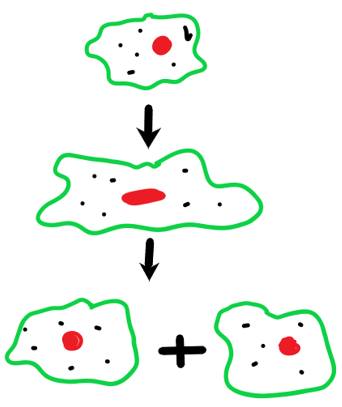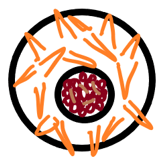This set of Class 12 Biology Chapter 1 Multiple Choice Questions & Answers (MCQs) focuses on “Asexual Reproduction”.
1. Which of the following undergoes binary fission?
a) Amoeba
b) Hydra
c) Yeast
d) Ring worm
View Answer
Explanation: Amoeba undergoes binary fission. Many single celled organisms undergo binary fission. The diagram depicts the process.

2. How does hydra reproduce?
a) Gemmules
b) Budding
c) Conidia
d) Zoospores
View Answer
Explanation: Hydra reproduces by forming buds externally. It grows and develops tentacles. It eventually separates from the parent and lives an independent life. This process may also be known as fragmentation in hydra since a part of it falls of and starts growing independently.
3. Which organism undergoes the phenomenon of encystation?
a) Plants
b) Amoeba
c) Ring worm
d) Fungi
View Answer
Explanation: Amoeba undergoes the phenomenon of encystation. Under unfavorable conditions, amoeba withdraws its pseudopodium and secretes a cyst that covers it.
4. Amoeba undergoes sporulation.
a) False
b) True
View Answer
Explanation: Sporulation is the phenomenon of encysted amoeba undergoing multiple fission to produce pseudopodiospores that are scattered into the environment to grow independently.
5. What does the following image depict?

a) Buds in yeast
b) Zoospores in Chlamydomonas
c) Conidia in Penicillium
d) Gemmules in sponges
View Answer
Explanation: Gemmules are reproductive structures produced by sponges. It is a form of internal budding. Each gemmule is defined as a mass of undifferentiated archaeocytes surrounded by a protective spicule. When the sponge degenerates, it releases the gemmules into the water.
6. Which one of the following is an example of a runner?
a) Lolium multiflorum
b) Narcissus
c) Bryophyllum daigremontianum
d) Kalanchoe
View Answer
Explanation: Lolium multiflorum also known as lawn grass is a type of runner. Narcissus is a plant that reproduces by bulb formation, like onions and the other 2 are plants that reproduce by adventitious buds.
7. What is budding also called in yeast?
a) Archaeocytes
b) Vegetative propagation
c) Torulation
d) Fragmentation
View Answer
Explanation: Budding is the process of formation of small mini structures similar to the parent that grow to an extent and then falls off to grow independently. It is also called torulation in yeast as a parent cell. Buds bearing buds resemble a fungi genus Torula.
8. Which of the following is not an example of vegetative propagation?
a) Offset
b) Sucker
c) Rhizome
d) Fragmentation
View Answer
Explanation: In some organisms a body part breaks and forms into an independent organism just like the parent. Hydra is one such organism which undergoes reproduction like that.
9. Which of the following is commonly known as walking fern?
a) Kalanchoe
b) Saintpaulia
c) Begonia
d) Adiantum caudatum
View Answer
Explanation: Adiantum caudatum is commonly known as walking fern. This is because their leaf tips form new plants when they come in contact with the soil. Others are an example of plants that reproduce by leaves. It forms buds on the notches and falls off when old enough to grow on its own. In begonia, the injured leaf grows into a new plant.
10. Offset can also be described as a ______
a) Thick runner
b) Thin tuber
c) Long rhizome
d) Short suckers
View Answer
Explanation: Offset is a thick runner type branch that helps in vegetative propagation by sub aerial stems. It can grow even if there is an injury and it will grow independently. Examples are Pistia, Eichhornia.
Sanfoundry Global Education & Learning Series – Biology – Class 12.
To practice all chapters and topics of class 12 Biology, here is complete set of 1000+ Multiple Choice Questions and Answers.
If you find a mistake in question / option / answer, kindly take a screenshot and email to [email protected]
- Practice Class 12 - Physics MCQs
- Practice Class 11 - Biology MCQs
- Practice Class 12 - Chemistry MCQs
- Check Class 12 - Biology Books
- Practice Class 12 - Mathematics MCQs
